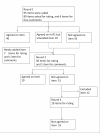Development of disaster mental health guidelines through the Delphi process in Japan
- PMID: 22747882
- PMCID: PMC3484075
- DOI: 10.1186/1752-4458-6-7
Development of disaster mental health guidelines through the Delphi process in Japan
Abstract
Background: The mental health community in Japan had started reviewing the country's disaster mental health guidelines before the Great East Japan Earthquake, aiming to revise them based on evidence and experience accumulated in the last decade. Given the wealth of experience and knowledge acquired in the field by many Japanese mental health professionals, we decided to develop the guidelines through systematic consensus building and selected the Delphi method.
Methods: After a thorough literature review and focus group interviews, 96 items regarding disaster mental health were included in Delphi Round 1. Of 100 mental health professionals experienced in disaster response who were invited to participate, 97 agreed. The appropriateness of each statement was assessed by the participants using a Likert scale (1: extremely inappropriate, 9: very appropriate) and providing free comments in three rounds. Consensus by experts was defined as an average score of ≥7 for which ≥70% of participants assigned this score, and items reaching consensus were included in the final guidelines.
Results: Overall, of the 96 items (89 initially asked and 7 added items), 77 items were agreed on (46 items in Round 1, and 19 positive and 12 negative agreed on items in Round 2). In Round 2, three statements with which participants agreed most strongly were: 1) A protocol for emergency work structure and information flow should be prepared in normal times; 2) The mental health team should attend regular meetings on health and medicine to exchange information; and 3) Generally, it is recommended not to ask disaster survivors about psychological problems at the initial response but ask about their present worries and physical condition. Three statements with which the participants disagreed most strongly in this round were: 1) Individuals should be encouraged to provide detailed accounts of their experiences; 2) Individuals should be provided with education if they are interested in receiving it; and 3) Bad news should be withheld from distressed individuals for fear of causing more upset.
Conclusions: Most items which achieved agreement in Round 1 were statements described in previous guidelines or publications, or statements regarding the basic attitude of human service providers. The revised guidelines were thus developed based on the collective wisdom drawn from Japanese practitioners' experience while also considering the similarities and differences from the international standards.
Figures
References
-
- Fukasawa M, Suzuki Y, Kim Y. Needs assessment of local governments for the disaster mental health services. Jpn Bull Soc Psychit. 2010;19:16–26. Japanese.
-
- Kim Y. Guidelines for Local Mental Health Care Activities after a Disaster. http://www.ncnp.go.jp/nimh/seijin/EnglishDisasterMentalHealth.pdf.
-
- The European Network for Traumatic Stress. The TENTS Guideline for Psychosocial Care Following Disasters and Major Incidents. http://www.tentsproject.eu/_site1264/dbfiles/document/_ ~ 57 ~ __7E64_7E....
-
- Inter-Agency Standing Committee (IASC) IASC Guidelines on Mental Health and Psychosocial Support in Emergency Settings. http://www.who.int/hac/network/interagency/news/iasc_guidelines_mental_h.... - PubMed
-
- National Child Traumatic Stress Network and National Center for PTSD. Psychological First Aid: Field Operations Guide. 2. http://www.nctsn.org/sites/default/files/pfa/english/1-psyfirstaid_final....
LinkOut - more resources
Full Text Sources
Research Materials



